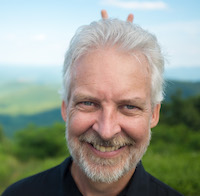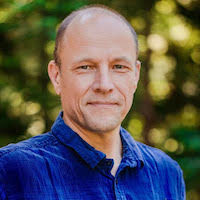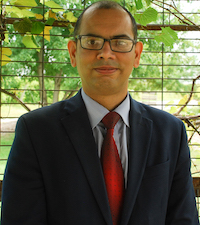2023 IEEE SERVICES Plenary Panel - Open-Source Science
Plenary Panel
Open-Source Science
Thursday July 6, 10:50 - 12:00
Regency Ballroom A/B
The plenary panel on Open-Source Science (OSSci) will bring together developers and scientists working together to accelerate scientific discovery. We consider the power of open source communities to help researchers share knowledge and bring the power of data and AI to bear on the challenges facing humanity. What are the patterns of OSS use in academia? How can we break the silos and achieve reuse, sharing common modes of AI augmentation across disciplines? What socio-technical structures can we harness or build to connect OSS champions in science and support their work, with growing participation in every field of discovery?
The panel opens the first IEEE OSSci Symposium, and most panelists will give invited talks later in the day elaborating on their ideas and experiences.
Panelists
 Dr. Anthony J. Annunziata is Director of Accelerated Discovery platform and ecosystem at IBM. He leads a global team bringing together foundation model and generative AI, quantum, and high performance hybrid cloud computing to deploy a revolutionary new technology platform to accelerate discovery and solution creation in science and business. As a core part of this mission, Anthony and team are cultivating a new community of partners, developers and scientists to advance the application of this advanced technology to challenges in health, climate, energy, manufacturing, and beyond that are crucial to societal progress and prosperity. Previously, Anthony was the executive leader who incubated IBM’s Quantum business and ecosystem, driving its creation and growth from inception to become the world's largest partnership network and mission-driven community in quantum computing; this included its incubation and scaling to a fast growing business for IBM. Previously, Anthony led research and development of magnetic memory technology, including translation to productization with leading semiconductor industry partners. Anthony earned his Ph.D. in Applied Physics from Yale University with a focus in superconducting devices and nanofabrication, and holds 102 patents.
Dr. Anthony J. Annunziata is Director of Accelerated Discovery platform and ecosystem at IBM. He leads a global team bringing together foundation model and generative AI, quantum, and high performance hybrid cloud computing to deploy a revolutionary new technology platform to accelerate discovery and solution creation in science and business. As a core part of this mission, Anthony and team are cultivating a new community of partners, developers and scientists to advance the application of this advanced technology to challenges in health, climate, energy, manufacturing, and beyond that are crucial to societal progress and prosperity. Previously, Anthony was the executive leader who incubated IBM’s Quantum business and ecosystem, driving its creation and growth from inception to become the world's largest partnership network and mission-driven community in quantum computing; this included its incubation and scaling to a fast growing business for IBM. Previously, Anthony led research and development of magnetic memory technology, including translation to productization with leading semiconductor industry partners. Anthony earned his Ph.D. in Applied Physics from Yale University with a focus in superconducting devices and nanofabrication, and holds 102 patents.

Dean Wampler (Mastodon: @deanwampler) is an expert in AI/ML systems. He is the Engineering Directory for "watsonx.ai" at IBM Research. Dean is the author of several books including Programming Scala, Third Edition, What Is Ray?, and Fast Data Architectures for Streaming Applications. He blogs on various topics at deanwampler.medium.com. Dean contributes to several open source projects and he speaks at many technology conferences and user groups. Dean has a Ph.D. in Physics from the University of Washington.
 Carlos Maltzahn is the PI of the Open Source Program Office (OSPO), UC Santa Cruz and the founder and director of the UC Santa Cruz Center for Research in Open Source Software (CROSS). He also co-founded the Systems Research Lab, known for its cutting-edge work on programmable storage systems, big data storage & processing, scalable data management, distributed system performance management, and practical reproducible evaluation of computer systems. Carlos joined UC Santa Cruz in 2004, after five years at Netapp working on network-intermediaries and storage systems. In 2005 he co-founded and became a key mentor on Sage Weil’s Ceph project. In 2008 Carlos became a member of the computer science faculty at UC Santa Cruz and has graduated nine Ph.D. students since. Carlos graduated with a M.S. and Ph.D. in Computer Science from University of Colorado at Boulder. His work is funded by nonprofits, government, and industry, including the National Science Foundation, US Department of Energy, the Alfred P. Sloan Foundation, and CROSS.
Carlos Maltzahn is the PI of the Open Source Program Office (OSPO), UC Santa Cruz and the founder and director of the UC Santa Cruz Center for Research in Open Source Software (CROSS). He also co-founded the Systems Research Lab, known for its cutting-edge work on programmable storage systems, big data storage & processing, scalable data management, distributed system performance management, and practical reproducible evaluation of computer systems. Carlos joined UC Santa Cruz in 2004, after five years at Netapp working on network-intermediaries and storage systems. In 2005 he co-founded and became a key mentor on Sage Weil’s Ceph project. In 2008 Carlos became a member of the computer science faculty at UC Santa Cruz and has graduated nine Ph.D. students since. Carlos graduated with a M.S. and Ph.D. in Computer Science from University of Colorado at Boulder. His work is funded by nonprofits, government, and industry, including the National Science Foundation, US Department of Energy, the Alfred P. Sloan Foundation, and CROSS.
 Paige Martin Paige is a Program Scientist with the Transform to Open Science (TOPS) Initiative. She envisions a future with inclusive, transparent, and robust scientific research, and believes that open science frameworks are the best tools to achieve this vision. She did her PhD in physical oceanography at the University of Michigan and her Postdoc in climate data science here at Columbia University’s Lamont Doherty Earth Observatory. She brings years of scientific and technical expertise in large-scale data analysis, open-source software, and cloud computing. In addition, she has helped lead open science communities, including running hackweeks and capacity sharing activities in multiple countries.
Paige Martin Paige is a Program Scientist with the Transform to Open Science (TOPS) Initiative. She envisions a future with inclusive, transparent, and robust scientific research, and believes that open science frameworks are the best tools to achieve this vision. She did her PhD in physical oceanography at the University of Michigan and her Postdoc in climate data science here at Columbia University’s Lamont Doherty Earth Observatory. She brings years of scientific and technical expertise in large-scale data analysis, open-source software, and cloud computing. In addition, she has helped lead open science communities, including running hackweeks and capacity sharing activities in multiple countries.
 Hridesh Rajan holds a Ph.D. and an MS from the University of Virginia both in Computer Science. His B.Tech. in Computer Science and Engineering is from the Indian Institute of Technology, Varanasi (formerly IT-BHU). Dr. Rajan is the Kingland Professor of Computer Science at Iowa State University, where he served three years (2017-2019) as the founding Professor-in-charge of Data Science Programs. During this period, he founded the annual Midwest Big Data Summer School to deliver broadly accessible data science training, served on the steering committee of the Midwest Big Data Hub, and led TADS (Theoretical and Applied Data Science), a cross-campus transdisciplinary research initiative of faculty and students interested in foundations and applications of Data Science. After this, he served as the Department Chair of Computer Science from 2019-2023, where he oversaw a significant growth period in both students, faculty, staff, and research funding. During his tenure as Department Chair, Dr. Rajan led the effort in diversity and inclusion leading to departmental broadening participation in computing plan and a 45% increase in female enrollment. Dr. Rajan has led the creation of new majors, minors and certificates including the M.S. degree in Artificial Intelligence, the Data Science Minor, Certificate, and B.S. degree programs, the B.A. degree in Computer Science. Rajan is a Fellow of the American Association for the Advancement of Science (AAAS) and a Fulbright Scholar. His research interests are in Data Science, Software Engineering and Programming Languages where he is most known for his design of the Ptolemy programming language that showed how to modularly reason about crosscutting concerns and the Boa programming language and its infrastructure that decreases the barriers to data-driven software engineering. He has been recognized by an NSF CAREER award in 2009, by the LAS Early Achievement in Research Award in 2010, a Big-12 Fellowship in 2012, an ACM Senior Membership in 2014, an exemplary mentor for Junior Faculty award in 2017, a Kingland Endowed Professorship in 2017, an ACM Distinguished Membership in 2017, a US-UK Fulbright Scholarship in 2018, a Facebook Probability and Programming Award in 2020, and an Early Achievement in Departmental Leadership Award in 2022. He was a Member of Technical Staff at Bell Labs, Lucent Technologies in Bangalore India from 2000 - 2001. Prof. Rajan is an ABET program evaluator.
Hridesh Rajan holds a Ph.D. and an MS from the University of Virginia both in Computer Science. His B.Tech. in Computer Science and Engineering is from the Indian Institute of Technology, Varanasi (formerly IT-BHU). Dr. Rajan is the Kingland Professor of Computer Science at Iowa State University, where he served three years (2017-2019) as the founding Professor-in-charge of Data Science Programs. During this period, he founded the annual Midwest Big Data Summer School to deliver broadly accessible data science training, served on the steering committee of the Midwest Big Data Hub, and led TADS (Theoretical and Applied Data Science), a cross-campus transdisciplinary research initiative of faculty and students interested in foundations and applications of Data Science. After this, he served as the Department Chair of Computer Science from 2019-2023, where he oversaw a significant growth period in both students, faculty, staff, and research funding. During his tenure as Department Chair, Dr. Rajan led the effort in diversity and inclusion leading to departmental broadening participation in computing plan and a 45% increase in female enrollment. Dr. Rajan has led the creation of new majors, minors and certificates including the M.S. degree in Artificial Intelligence, the Data Science Minor, Certificate, and B.S. degree programs, the B.A. degree in Computer Science. Rajan is a Fellow of the American Association for the Advancement of Science (AAAS) and a Fulbright Scholar. His research interests are in Data Science, Software Engineering and Programming Languages where he is most known for his design of the Ptolemy programming language that showed how to modularly reason about crosscutting concerns and the Boa programming language and its infrastructure that decreases the barriers to data-driven software engineering. He has been recognized by an NSF CAREER award in 2009, by the LAS Early Achievement in Research Award in 2010, a Big-12 Fellowship in 2012, an ACM Senior Membership in 2014, an exemplary mentor for Junior Faculty award in 2017, a Kingland Endowed Professorship in 2017, an ACM Distinguished Membership in 2017, a US-UK Fulbright Scholarship in 2018, a Facebook Probability and Programming Award in 2020, and an Early Achievement in Departmental Leadership Award in 2022. He was a Member of Technical Staff at Bell Labs, Lucent Technologies in Bangalore India from 2000 - 2001. Prof. Rajan is an ABET program evaluator.
 Ernesto Damiani Ernesto Damiani is Director of the Center for Cyber-Physical System at Khalifa University, Abu Dhabi, and Full Professor at the Department of Computer Science, Università degli Studi di Milano, Italy, where he leads the SESAR research lab, and President of the National Interuniversity Consortium for Computer Science. His research interests include Artificial Intelligence, Machine Learning, Cyber-physical systems, secure service-oriented architectures, privacy-preserving big data analytics and cyber-physical systems security. Ernesto holds/has held visiting positions at a number of international institutions, including George Mason University in Virginia, US, Tokyo Denki University, Japan, LaTrobe University in Melbourne, Australia, and the Institut National des Sciences Appliquées (INSA) at Lyon, France. He is a Fellow of the Japanese Society for the Progress of Science. He has been Principal Investigator in a number of large-scale research projects funded by the European Commission, the Italian Ministry of Research and by private companies such as British Telecom, Cisco Systems, SAP, Telecom Italia, Siemens Networks (now Nokia Siemens) and many others. His serves in the editorial board of several international journals; among others, he is the EIC of the International Journal on Big Data and of the International Journal of Knowledge and Learning. He is associate editor of the IEEE Transactions on Service-oriented Computing and of the IEEE Transactions on Fuzzy Systems. His served as vice-chair of the IEEE Technical Committee on Industrial Informatics. In 2008, Ernesto was nominated ACM Distinguished Scientist and received the Chester Sall Award from the IEEE Industrial Electronics Society. Ernesto has co-authored more than 720 scientific papers and many books, including “Open Source Systems Security Certification” (Springer 2009).
Ernesto Damiani Ernesto Damiani is Director of the Center for Cyber-Physical System at Khalifa University, Abu Dhabi, and Full Professor at the Department of Computer Science, Università degli Studi di Milano, Italy, where he leads the SESAR research lab, and President of the National Interuniversity Consortium for Computer Science. His research interests include Artificial Intelligence, Machine Learning, Cyber-physical systems, secure service-oriented architectures, privacy-preserving big data analytics and cyber-physical systems security. Ernesto holds/has held visiting positions at a number of international institutions, including George Mason University in Virginia, US, Tokyo Denki University, Japan, LaTrobe University in Melbourne, Australia, and the Institut National des Sciences Appliquées (INSA) at Lyon, France. He is a Fellow of the Japanese Society for the Progress of Science. He has been Principal Investigator in a number of large-scale research projects funded by the European Commission, the Italian Ministry of Research and by private companies such as British Telecom, Cisco Systems, SAP, Telecom Italia, Siemens Networks (now Nokia Siemens) and many others. His serves in the editorial board of several international journals; among others, he is the EIC of the International Journal on Big Data and of the International Journal of Knowledge and Learning. He is associate editor of the IEEE Transactions on Service-oriented Computing and of the IEEE Transactions on Fuzzy Systems. His served as vice-chair of the IEEE Technical Committee on Industrial Informatics. In 2008, Ernesto was nominated ACM Distinguished Scientist and received the Chester Sall Award from the IEEE Industrial Electronics Society. Ernesto has co-authored more than 720 scientific papers and many books, including “Open Source Systems Security Certification” (Springer 2009).
 Alexy Khrabrov is the Open-Source Science Community Director at IBM Research. He previously was a Technical Ecosystem Development Lead at IBM Quantum, Chief Scientist at Nitro, an Australian public company, a software engineer at Amazon, and a co-founder and engineer at several Bay Area startups. Dr. Khrabrov is an experienced community steward, builder and organizer, having created and run multiple meetups and open-source conferences in San Francisco Bay Area and around the world. Dr. Khrabrov's work is focused in community stewardship building distributed systems for ML/AI applications, functional programming, and building partnerships around OSS work. At IBM he started Open-Source Science, an initiative based at NumFOCUS, dedicated to accelerating research around the crucial challenges facing humanity with Open-Source Software and Open Data.
Alexy Khrabrov is the Open-Source Science Community Director at IBM Research. He previously was a Technical Ecosystem Development Lead at IBM Quantum, Chief Scientist at Nitro, an Australian public company, a software engineer at Amazon, and a co-founder and engineer at several Bay Area startups. Dr. Khrabrov is an experienced community steward, builder and organizer, having created and run multiple meetups and open-source conferences in San Francisco Bay Area and around the world. Dr. Khrabrov's work is focused in community stewardship building distributed systems for ML/AI applications, functional programming, and building partnerships around OSS work. At IBM he started Open-Source Science, an initiative based at NumFOCUS, dedicated to accelerating research around the crucial challenges facing humanity with Open-Source Software and Open Data.